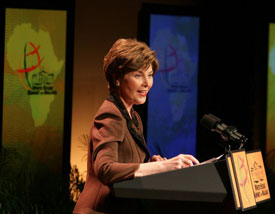The Malaria Communities Program (MCP)
Eligibility and Timeline | About MCP | Application Preparation | Resources
 |
|
| Mrs. Laura Bush delivers remarks at the first-ever White House Summit on Malaria, Thursday, Dec. 14, 2006, at the National Geographic Society in Washington, D.C. The President’s Malaria Initiative announced at the summit that it will launch a further $30 million Malaria Communities Program to build independent, sustainable malaria-control projects in Africa. Source: Shealah Craighead/White House | |
Reaching out to build lasting new community partnerships in the fight against malaria.
On December 14, 2006, the President and Mrs. Bush hosted a White House Summit on Malaria in Washington, D.C., to further raise awareness about malaria and mobilize a grassroots effort to save millions of lives from the disease in Africa. At this Summit, the Malaria Communities Program (MCP) was announced. The MCP is a $30 million initiative created under the PMI to support the efforts of communities and indigenous organizations to combat malaria in Africa. The MCP will identify and enable groups to become new partners in the effort to extend the coverage of malaria prevention and control activities to reach a larger proportion of those most affected by malaria, particularly children under age 5 and pregnant women.
MCP Objectives and Authority
The MCP is a program created under the PMI to support the efforts of communities and indigenous organizations to combat malaria at the local level. The MCP will identify and enable groups to become new partners in malaria control in Africa, specifically aiming to:
- Identify and support potential new partner organizations and networks of community-based organizations uniquely positioned to work at the community level in PMI focus countries
- Increase local and indigenous capacity to undertake community-based malaria prevention and treatment activities
- Build local ownership of malaria control for the long-term in partnership with communities and national malaria control programs (NMCPs)
- Extend coverage of PMI and NMCP efforts to reach a larger beneficiary population with malaria prevention and control interventions (primary beneficiary groups for the PMI are children under age 5 and pregnant women)
Cooperative agreements are executed pursuant to the authority of the Foreign Assistance Act of 1961, as amended, subject to the availability of funds.
For more information on the MCP in general, please contact pmimcp@usaid.gov.